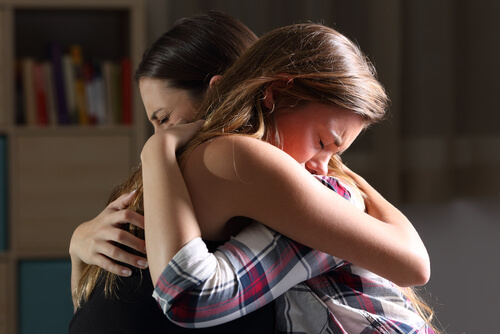The Importance of Hugs in the Family


Reviewed and approved by the psychologist María Alejandra Castro Arbeláez
Hugs are one of the most important expressions of affection in our lives. Not only because they show us affection but because they bring us closer to others. With that in mind, we want to talk about the importance of hugs in the family.
Stop for a moment and think: How long has it been since you offered a hug to your partner, your children, or your parents? Have you noticed that physical contact with your loved ones may not be as tangible as you think? How are you in this regard?
What do hugs do?
- They bring people closer.
- They show support and solidarity.
- They provide a feeling of protection.
- They show affection, appreciation, esteem.
- They provide comfort (regardless of whether the person is sad or not).
- And, in view of all of the above, they have the power to heal emotional wounds.
All these reasons show that hugs are more necessary than you might think. Hugs in the family are especially important. Many times we take things for granted because we believe that, given their simplicity, they don’t need much attention.

However, we must understand that, no matter how simple the gestures are, it’s necessary to take care of them, maintain them, and promote them. Do we really need to always wait for an ideal moment? And why not create those ideal moments ourselves and, in this way, make our lives more beautiful?
Why reserve affection, words, and positive actions? In this sense, the saying applies very well: Don’t leave for tomorrow what you can do today.
When there’s freedom to express oneself in a home, bonds are healthier and relationships develop in a much more positive and spontaneous way.
What happens with hugs in the family on a daily basis?
It’s the first hour of the day. Everyone must rush to get to work, school, and related commitments on time. While some run from one place to another, others choose to eat breakfast while trying to do something else.
When the night comes, each one locks himself in their world due to exhaustion and nobody comes closer than just enough. “Good night” may even be sent through social media.
This day-to-day routine means that, in the best of cases, kisses are thrown from a distance, and phrases like: “Have a nice day” and “I love you” are drowned out by the chaos that surrounds us. On the other hand, in the worst cases, silence and distancing are implemented as a form of “respect” or giving one another space.
But there’s an important difference. Respecting a person doesn’t mean that you shouldn’t express affection. If your children get used to this type of treatment, in the future, they won’t know how to show their affection or even dare to try.
If this happens in your home, you need to invest time in looking for a change. The initiative can be yours or that of your child or any other member of the family, and the important thing is that it’s received with gratitude and is maintained over time. It’s never too late to give a heartfelt hug.
Giving hugs often doesn’t mean that we’re clingy or that we’re developing emotional dependency. On the contrary, it’s about promoting the best of each one of us and creating healthy bonds.
The chemistry of hugs
The simple act of hugging a person stimulates the production of a series of hormones that provide well-being:
- Oxytocin
- Serotonin
- Dopamine
As if that weren’t enough, the action of hugging increases the production of white blood cells in your body, which strengthens the immune system. Remember that you can improve another person’s day with just a hug.

Family psychotherapist Virginia Satir has led scientific studies that have shown that a person needs at least 4 hugs a day to endure their responsibilities; 8 to provide wellness, and 12 to promote their personal growth.
Our advice regarding hugs in the family
- Don’t miss the opportunity to hug your loved ones whenever you consider it necessary.
- Enjoy hugging. Don’t let it become a mechanical action.
- Whenever an argument breaks out at home, once things have calmed down, try to talk things out and hug one another. This will help put the discomfort behind you.
- When you notice that something is wrong with your children, ask them what’s going on. They may refuse to talk about their problems, but they certainly won’t refuse a comforting hug.
- Celebrate every achievement, no matter how small, with a hug.
- Accompany any word of encouragement with a hug and every time you want to give one, just do it!
Hugs are one of the most important expressions of affection in our lives. Not only because they show us affection but because they bring us closer to others. With that in mind, we want to talk about the importance of hugs in the family.
Stop for a moment and think: How long has it been since you offered a hug to your partner, your children, or your parents? Have you noticed that physical contact with your loved ones may not be as tangible as you think? How are you in this regard?
What do hugs do?
- They bring people closer.
- They show support and solidarity.
- They provide a feeling of protection.
- They show affection, appreciation, esteem.
- They provide comfort (regardless of whether the person is sad or not).
- And, in view of all of the above, they have the power to heal emotional wounds.
All these reasons show that hugs are more necessary than you might think. Hugs in the family are especially important. Many times we take things for granted because we believe that, given their simplicity, they don’t need much attention.

However, we must understand that, no matter how simple the gestures are, it’s necessary to take care of them, maintain them, and promote them. Do we really need to always wait for an ideal moment? And why not create those ideal moments ourselves and, in this way, make our lives more beautiful?
Why reserve affection, words, and positive actions? In this sense, the saying applies very well: Don’t leave for tomorrow what you can do today.
When there’s freedom to express oneself in a home, bonds are healthier and relationships develop in a much more positive and spontaneous way.
What happens with hugs in the family on a daily basis?
It’s the first hour of the day. Everyone must rush to get to work, school, and related commitments on time. While some run from one place to another, others choose to eat breakfast while trying to do something else.
When the night comes, each one locks himself in their world due to exhaustion and nobody comes closer than just enough. “Good night” may even be sent through social media.
This day-to-day routine means that, in the best of cases, kisses are thrown from a distance, and phrases like: “Have a nice day” and “I love you” are drowned out by the chaos that surrounds us. On the other hand, in the worst cases, silence and distancing are implemented as a form of “respect” or giving one another space.
But there’s an important difference. Respecting a person doesn’t mean that you shouldn’t express affection. If your children get used to this type of treatment, in the future, they won’t know how to show their affection or even dare to try.
If this happens in your home, you need to invest time in looking for a change. The initiative can be yours or that of your child or any other member of the family, and the important thing is that it’s received with gratitude and is maintained over time. It’s never too late to give a heartfelt hug.
Giving hugs often doesn’t mean that we’re clingy or that we’re developing emotional dependency. On the contrary, it’s about promoting the best of each one of us and creating healthy bonds.
The chemistry of hugs
The simple act of hugging a person stimulates the production of a series of hormones that provide well-being:
- Oxytocin
- Serotonin
- Dopamine
As if that weren’t enough, the action of hugging increases the production of white blood cells in your body, which strengthens the immune system. Remember that you can improve another person’s day with just a hug.

Family psychotherapist Virginia Satir has led scientific studies that have shown that a person needs at least 4 hugs a day to endure their responsibilities; 8 to provide wellness, and 12 to promote their personal growth.
Our advice regarding hugs in the family
- Don’t miss the opportunity to hug your loved ones whenever you consider it necessary.
- Enjoy hugging. Don’t let it become a mechanical action.
- Whenever an argument breaks out at home, once things have calmed down, try to talk things out and hug one another. This will help put the discomfort behind you.
- When you notice that something is wrong with your children, ask them what’s going on. They may refuse to talk about their problems, but they certainly won’t refuse a comforting hug.
- Celebrate every achievement, no matter how small, with a hug.
- Accompany any word of encouragement with a hug and every time you want to give one, just do it!
All cited sources were thoroughly reviewed by our team to ensure their quality, reliability, currency, and validity. The bibliography of this article was considered reliable and of academic or scientific accuracy.
- Comesaña, J. M. C. (2011). Bases para construir una comunicación positiva en la familia. Revista de investigación en educación, 9(2), 91-98. http://reined.webs4.uvigo.es/index.php/reined/article/view/116
- López, G., & Guiamaro, Y. (2016). El rol de la familia en los procesos de educación y desarrollo humano de los niños y niñas. Ixaya. Revista Universitaria de desarrollo social, (10), 31-55. http://revistaixaya.cucsh.udg.mx/index.php/ixa/article/view/6742
- Winnicott, D. W. (1995). La familia y el desarrollo del individuo. Lumen/Hormé.
This text is provided for informational purposes only and does not replace consultation with a professional. If in doubt, consult your specialist.








